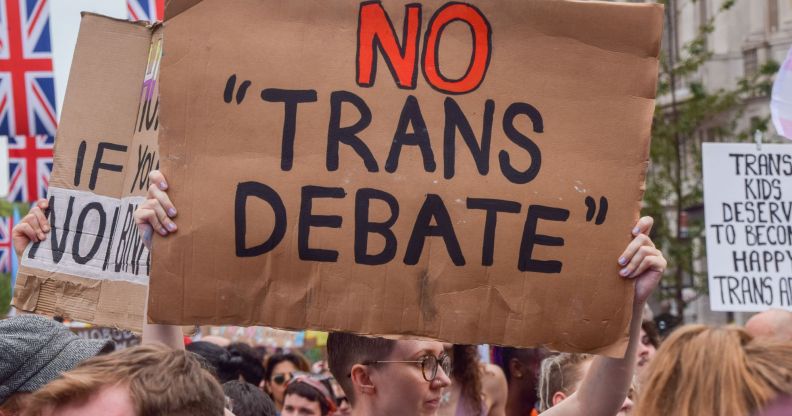Just three per cent of queer Brits use trans-exclusive acronym ‘LGB’, study finds

The YouGov poll find that a tiny percentage of individuals use the anti-trans term LGB.
Queer Britons are far more likely to include trans people in any acronym they use to describe their community, despite what anti-trans groups might have you believe.
A survey of 969 LGBTQ+ Brits, published by the highly regarding research company YouGov, found that just three per cent use the acronym LGB when referring to the community.
The shorter acronym, which refers to lesbian, gay and bisexual individuals, is often used as a way to exclude trans and queer individuals and is typically used by anti-trans groups.
One in nine (11 per cent) people use the more extensive LGBTQIA+, with the “I” standing for intersex and the “A” for asexual, aromantic or agender, while eight per cent use LGBT+.
Combining the results for the acronym with and without a “+” shows LGBTQ(+) to be by far the most common, at 42 per cent, followed by LGBT(+) at 29 per cent, and LGBTQIA(+) 13 per cent.
Twenty-four per cent of gay or lesbian respondents were more likely to use the acronym LGBTQ+, while 34 per cent of bisexual people also use the term. Heterosexual Britons were far more likely to use the term LGBT.
Women also predominantly used the term LGBTQ+ (35 per cent) compared with men, who were slightly more likely to use the phrase LGBT, the research showed.
Of those who predominantly used the term LGB, just three per cent identify as gay, lesbian or bisexual, while nine per cent identified as heterosexual.
Additionally, men were more likely to use the anti-trans acronym (four per cent), while only two per cent of women used it.
Age-wise, respondents aged between 45 and 54 were most likely to use the short acronym, at seven per cent, while just one per cent of 16 to 24 year olds used LGB.
Meanwhile, usage of LGBTQ+ is particularly prevalent (41 per cent) among the youngest queer Britons surveyed: those aged between 16 and 24. Overall, 56 per cent of this age group use either LGBTQ or LGBTQ+.
The findings seem to disprove claims by groups such as the LGB Alliance and The Lesbian Project, as well as several “gender-critical” pundits, that including the “T” somehow erases the rights of lesbian, gay and bisexual people.
Lesbian Project co-founder Kathleen Stock has previously said that trans women should be banned from women’s single-sex spaces and that the prospect of self-ID – by which trans people would be able to change their gender markers without underlying medical requirements – would threaten a “secure understanding of the concept ‘lesbian’.”
This rhetoric derives from an underlying belief that trans women are not women. Stock has said in the past that she believes “many trans women are still males with male genitalia.“
Many pro-trans activists also took the figures as a chance to debunk myths that there is a “civil war” within the community over the inclusion of trans people when, not only have they always been included, but their role has been pivotal in gaining LGBTQ+ rights.
The poll proved that the community “overwhelmingly see trans people as part of their community”, gay journalist Owen Jones wrote.
“Stop pretending there’s a civil war,” he continued. “There isn’t.”
Trans rights group Bristol Leading Against Transphobia wrote in a post: “Don’t be fooled by right-wing media and [gender-critical] anti-trans groups that claim there is a split between LGB and the rest of our community.”
And EuroPride board member Steve Taylor agreed that, despite gender-critical pundits being “good at making lots of noise,” the reality proved a divide between cisgender lesbian, gay and bisexual people and trans individuals simply doesn’t exist.
“The vast majority of LGBTI+ people are #LGBwiththeT,” he said.
How did this story make you feel?

